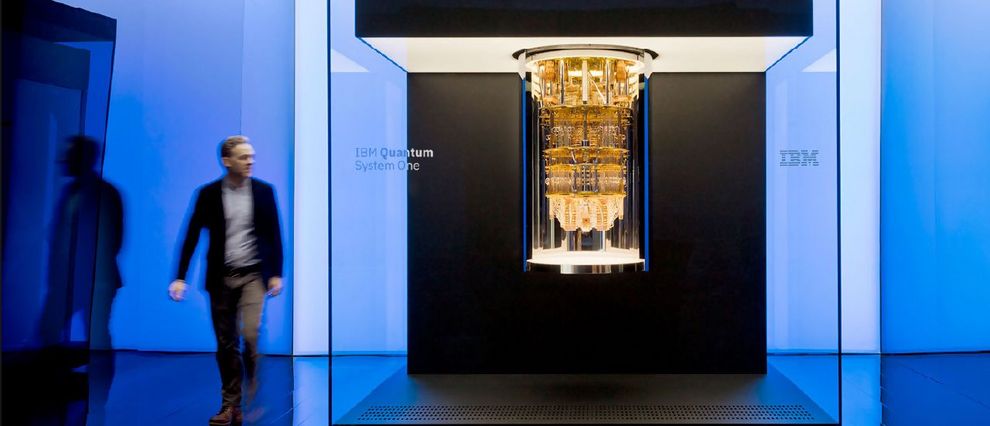Practical quantum computing moves closer.
Quantum computers are something like the holy grail of information technology. In the world's most advanced laboratories, the best physicists, mathematicians, and IT specialists are striving to make quantum computing available for everyday use outside the labs. The reason: Due to its enormous power quantum computing has the potential to change not only the IT world, but the world itself.
#IBM #Power as a Service #IBM Z
The last few months have seen great progress in the field of quantum computing. Important milestones in the development of quantum computers have been announced in various laboratories around the world, at universities, and at major companies such as IBM. For example, at New South Wales University in Sydney, Australia, it was recently announced that large quantum chips could be available much sooner than expected[i].
More qubits per chip
Quantum computer technology is far too complex to even begin to describe in an article like this. This much, however, can be said: The reported progress should make it possible to deploy and use not just a few quantum bits (qubits) per chip, but millions of them. This would solve one of the biggest challenges for the commercial use of quantum computing.[ii]. Due to their physical properties, qubits make it possible to represent the ones and zeros that are the basis of digital technology. A qubit can be both a one and a zero at the same time. It is precisely this property that makes quantum computing so immensely interesting, powerful - and highly complicated. Specialists know that quantum computers can perform calculations and simulations in one short step that would take conventional modern computers hundreds of thousands or even millions of years.
Quantum computers are colder than space
Physicists at the Harvard-MIT Center for Ultracold Atoms are also working to build a quantum computer that will utilize more quantum bits. It is a 256 qubit quantum simulator. It is the combination of the system's size and its programmability that puts it at the forefront of the race to build a quantum computer, the researchers say. An increasing number of qubits means the system becomes exponentially more powerful. According to the researchers, the number of quantum states possible with just 256 qubits exceeds the number of atoms in the solar system.[iii]
Speaking of the solar system, the temperatures required to compute with qubits are lower than those measured in space. Almost minus 273 degrees Celsius are required to slow down the movement of the atoms and keep the qubits stable. Thus, cooling systems pose a huge challenge for quantum computing technology.
One OS for all quantum computers?
To date, an estimated 50 quantum computers have been built in various laboratories around the world. These projects use a wide variety of operating systems - there is no Windows or Unix for quantum computers - yet. That is about to change if the ideas of a consortium led by the University of Cambridge are anything to go by. The goal is an operating system that makes it possible to run the same quantum software on different quantum computers. The first step has been taken: There is now a quantum operating system that can fit on a chip. The software was developed by University of Cambridge startup Riverlane and printed on a chip by SEEQC, a semiconductor company. A press release from consortium member SEEQC says, "Simply put, we've taken a system that used to fill an entire room and packed it onto a chip the size of a coin - and it works." SEEQC is a U.S.-based semiconductor company with large labs in the U.K. that develops commercially viable application-specific quantum computing systems for global companies. The operating system, by the way, already has a name: It is called Deltaflow.OS[iv].
Quantum computing for the cloud
IBM too is active in quantum computer research - and has big goals[v]. The company plans to introduce the IBM Quantum Eagle 127-qubit processor later this year. The processor will include upgrades such as through-silicon vias and multi-level wiring, and is said to be capable of reducing crosstalk errors. As early as next year, IBM plans to introduce the IBM Quantum Osprey system with 433 quantum bits that can scale with improved infrastructure for cooling and control. By 2023, Big Blue then plans to create a quantum computer system with 1121 qubits. In the long term, the company even plans systems with more than a million qubits. Jay Gambetta, vice president of IBM Quantum, says the company's roadmap is part of a mission to develop "a complete quantum computer that is delivered via the cloud and can be programmed by anyone in the world." In fact, the cooling mechanisms required for current quantum technology will ensure that quantum computers are primarily located in data centers and can be used via cloud computing. For the 1121 qubit quantum computer, IBM is planning a giant refrigerator named GoldenEye[vi] - James Bond says hello.
Leading edge technology from UMB and IBM
Quantum computers are not yet available for use in our data centers. However, new computers based on conventional technology are also enormously powerful and designed to meet the requirements of modern cloud computing platforms. For example, IBM recently officially launched the first server in their new Power10 series. Orders are currently being taken for it; delivery is scheduled to begin before the end of September. Power10 is designed to meet the unique infrastructure requirements created by hybrid cloud computing. At the core of the server, the Power10 chip provides up to three times the energy efficiency and workload capacity of Power9. IBM's Power10 is the first server series ever with commercial 7nm processors. With the stated goal of making Red Hat OpenShift the standard for the hybrid cloud, IBM brings hardware-based capacity improvements and increased container security to the IT infrastructure layer with Power10.
IBM and UMB share decades of successful cooperation. UMB's experience guarantees unrivaled know-how when it comes to server technology, the cloud, and data centers. UMB is the leading Swiss cloud provider and the most certified IBM partner in Switzerland. Contact us if you would like to know more.
[ii]New quantum computing breakthrough may be key to large-scale quantum chips | TechRadar
[iii]Harvard-MIT Quantum Computing Breakthrough – “We Are Entering a Completely New Part of the Quantum World” (scitechdaily.com)
[v]IBM's Roadmap For Scaling Quantum Technology | IBM Research Blog
[vi]IBM 'super-fridge' aims to solve quantum computer cooling problem - (techhq.com)


